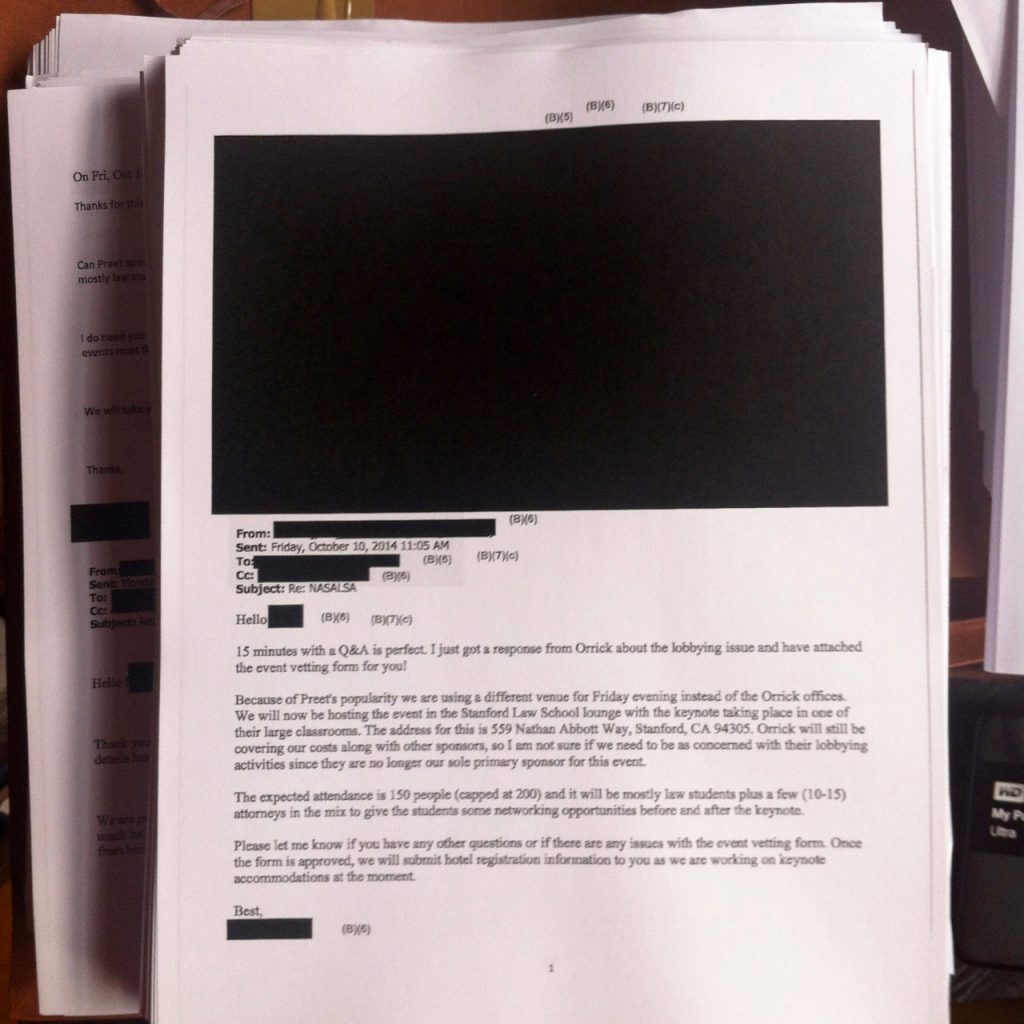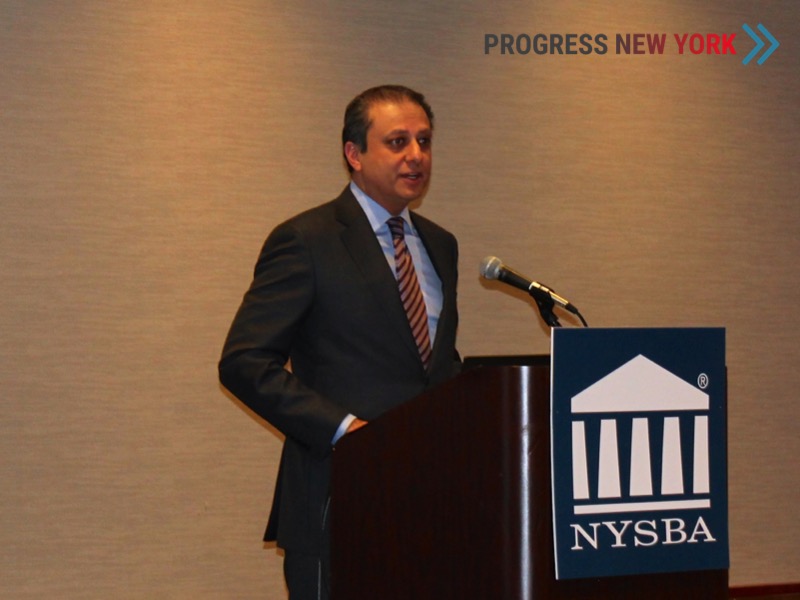To continue undermining FOIA, DOJ enlists help from the U.S. Attorney’s Office formerly headed by Preet Bharara.
By Progress New York Staff
Litigation that is approaching two years in length, seeking the release of records of former U.S. Attorney Preet Bharara‘s speeches, is reaching a possible conclusion in U.S. District Court in Manhattan. Defendant U.S. Department of Justice commenced dispositive motion practise to dismiss the Complaint that was filed to seek the release of the records. The Government, represented by the same U.S. Attorney’s Office formerly headed by former U.S. Attorney Bharara, has released transcripts, prepared remarks, or other records for approx. 40 speeches, but records for many other possible speeches remain unreleased.
The release of records, under regulations provided for under the Freedom of Information Act, or FOIA, has been taking place in the lead-up to the publication of Doing Justice : A Prosecutor’s Thoughts on Crime, Punishment, and the Rule of Law, a book of reflections by the Nation’s former top prosecutor in New York’s southern district. It was estimated that Former U.S. Attorney Bharara received $1 million for his book deal, according to a report published by the New York Post. Book deals that lead to such large advances usually require exclusivity in order to generate best-seller status upon a book’s release in order for publishers to recover significant monies fronted to authors. If the Government permits former U.S. Bharara to maintain exclusivity over some of his speech records, then it might be shown that the Nation’s former top prosecutor has engaged in unjust enrichment from his time in office, charges, ironically, that he essentially brought against a number of officials he accused of public corruption. The Government’s deadline to respond to the accusation of unjust enrichment is today, and it is not yet known how, or if, the Government will address such charges. Since being fired by President Donald Trump (R) during a purge at the DOJ, former U.S. Attorney Bharara’s glossy media image as a reformer has been undone by reports by the WNYC 93.9 FM public radio station and Pro Publica, amongst others, that he carried out class- and race-based investigations and arrests after his office protected Wall Street CEO’s from criminal prosecution, respectively.

Some of the records released by the DOJ reveal that former U.S. Attorney Bharara agreed to speak at events sponsored by at least one large law firm with a significant while collar criminal defense practise group, and that law firm ostensibly represented defendants in investigations by the Federal prosecutors’ office formerly headed by the top ex-prosecutor. Former U.S. Attorney Bharara once complained that, “[T]here is a substantial transparency throughout New York [G]overnment,” the DOJ refused to release transcripts for dozens of speeches given, or references to speeches thought to have been given, by former U.S. Attorney Bharara. To limit the release of records, the Government has argued that the public’s right to obtain Government records is not absolute. Reflecting this narrative, the Government filed a motion to dismiss the FOIA Lawsuit, and, to support its motion, the Government has filed declarations sworn under penalty of perjury describing searches for records that were shown to have been incomplete, and, therefore, unlawful. Congress enacted FOIA to “ensure an informed citizenry, vital to the functioning of a democratic society, needed to check against corruption and to hold the governors accountable to the governed.” NLRB v. Robbins Tire & Rubber Co., 437 U.S. 214, 242 (1978). The Government’s actions show that the Government is violating the spirit and the intent of FOIA.
Though Manhattan Federal Court is considered nation’s most prestigious, S.D.N.Y. judge countenances DOJ’s violations of law, civil procedure.
The litigation over the release of records is being presided over by John Koeltl, who was appointed to the Federal bench by former President William J. Clinton (D). Following the commencement of litigation, Judge Koeltl stated that protecting the reputation of the U.S. Attorney’s Office would be a consideration in any decision to release records. In response to the appearance of judicial bias appearing to be cognitive, Judge Koeltl was the subject of at least one complaint of judicial misconduct or disability filed with a Federal judicial panel. In the time since, Judge Koeltl has countenanced violations of FOIA, including the making of inadequate and unlawful searches, the making of misrepresentations in declarations filed under penalty of perjury by Darian Hodge and Tricia Francis, violations of civil procedure, and the setting of deadlines that have acted as penalties against a reporter for Progress New York, who is the Plaintiff in the litigation.
According to press reports, Judge Koeltl has faced accusations of using extremism against activists and making prejudicial statements that are disqualifiable. Judge Koeltl arguably sent the now late activist attorney, Lynne Stewart, to an early grave after the judge increased her prison sentence at his sole discretion following an unusual request made by the Government. Judge Koeltl has also faced public criticism over showing bias to one party over another. Recently, Judge Koeltl was assigned to preside over the Democratic National Committee‘s frivolous lawsuit against WikiLeaks, and others, alleging collusion with the Russian Federation to interfere in the 2016 U.S. presidential election. Both Judge Koeltl and former U.S. Attorney Bharara both teach at New York University School of Law. Judge Koeltl has also, in the past, recused himself from cases where conflicts of interest were obvious, but he has only done so temporarily. Because Progress New York engages in activism-based, data reporting, the District Court Judge’s pattern of using extremism against activists, his refusal to completely comply with ethics rules about conflicts of interest, and his Government-directed rulings demonstrates that there is a possibility that the District Court Judge is deliberately engaged in judicial misconduct.
The Government is being represented by Rebecca Tinio, a Federal prosecutor in the U.S. Attorney’s Office. The bad faith acts and misconduct by the Government, the Government’s counsel, and the District Court judge are taking place as the DOJ is being directed by Matthew Whitaker, an unconfirmed Attorney General, who has subverted Agency ethics guidance procedures in an attempt to gain control over the independent counsel investigation into allegations of corruption and criminality by President Donald Trump (R), his 2016 presidential campaign, and his businesses. Because the DOJ is in violation of FOIA, it is not known how the Agency will be able to enforce violations of State open records laws, like by the City of New York, when it, itself, is in violation of Federal open records laws. The Government may address that contradiction is its Court filings, which it is expected to make later today. Once each prestigious, the Manhattan Federal prosecutors’ office and the Manhattan U.S. District Court have succumbed to political pressures by engaging in bias and misconduct, issuing compromised ethics recommendations, and reaching investigation outcomes that serve the political agenda of significant Government officials at the expense of serving the public interest.

